Focuslight is shining example for China's manufacturing sector
By Andrew Moody (China Daily) Updated: 2015-09-21 07:52"It is no good giving a subsidy of 50,000 yuan to a Chinese manufacturer for every electric car it makes. It is better to give it to the consumer so they can choose the best electric car on the market."
Shaun Breslin, professor of politics and international studies at Warwick University in the UK, said debates in China about moving up the manufacturing value chain date back to the 1980s.
"I don't think it is a matter of just saying it, you have to put a whole lot of other things in place so that innovation can actually happen," he said.
"This brings up a whole series of thorny questions that go directly back to the education system and whether it allows sufficient freedom of thinking to create genuine innovation."
Despite the renewed focus on manufacturing, the sector is no longer the main driver of the economy.
It grew by only 6.1 percent in the second quarter of this year, down from 6.4 percent in the first quarter, and slower than the overall rate of economic growth of 7 percent.
Meanwhile, services-which already comprise a larger proportion of GDP than manufacturing-grew by 8.4 percent in the second quarter, up from 7.9 percent in the first.
It brings into question whether China should follow the UK and US model, where services are around 80 percent of the overall economy, or the German one, where manufacturing is a key driver.
Shi Yongjiang, research director of the Centre for International Manufacturing at Cambridge University, said this is a more complex question than many assume because there is an increased blurring between what can be defined as manufacturing and what a service industry.
"Take Rolls Royce, the aero-engine maker, for example, around half of its profits come from leasing its engines to airlines and providing the finance for that," Shi added.
"So is this a service or is it manufacturing? You have this definitional problem everywhere now."
For William Kirby, T.M. Chang Professor of China Studies at Harvard University, regardless of these definitions, the role model for China has to be Germany.
"Who would not want to be like Germany? Even with a relatively high-cost base, it manages to maintain its manufacturing advantage extraordinarily well," he said.
"It has an excellent school system that places emphasis on vocational training, and has built a real strong base in this sector. As a result, Germany has managed to hang onto industries the US has just failed to."
- Railway to connect China, Thailand
- Warner Bros, CMC in joint venture to launch China movies
- China calls for better management of small hydropower stations
- Italian motorcycle marque revs up reputation in China
- BMW redefines luxury driving at 2015 Frankfurt motor show
- German carmaker Borgward attempts comeback with SUV
- SOE reform plan looks too broad to brush out problems
- Small can be beautiful for investors in Africa















